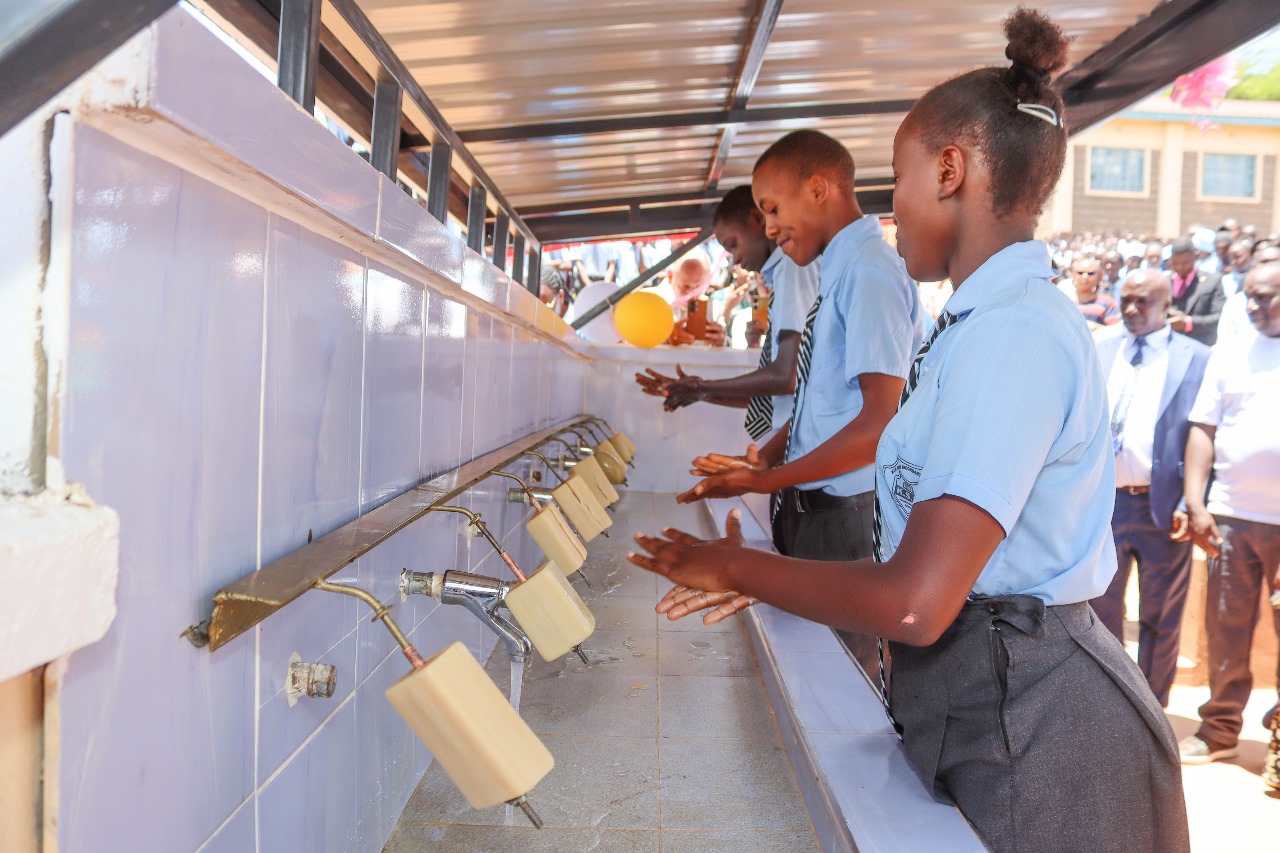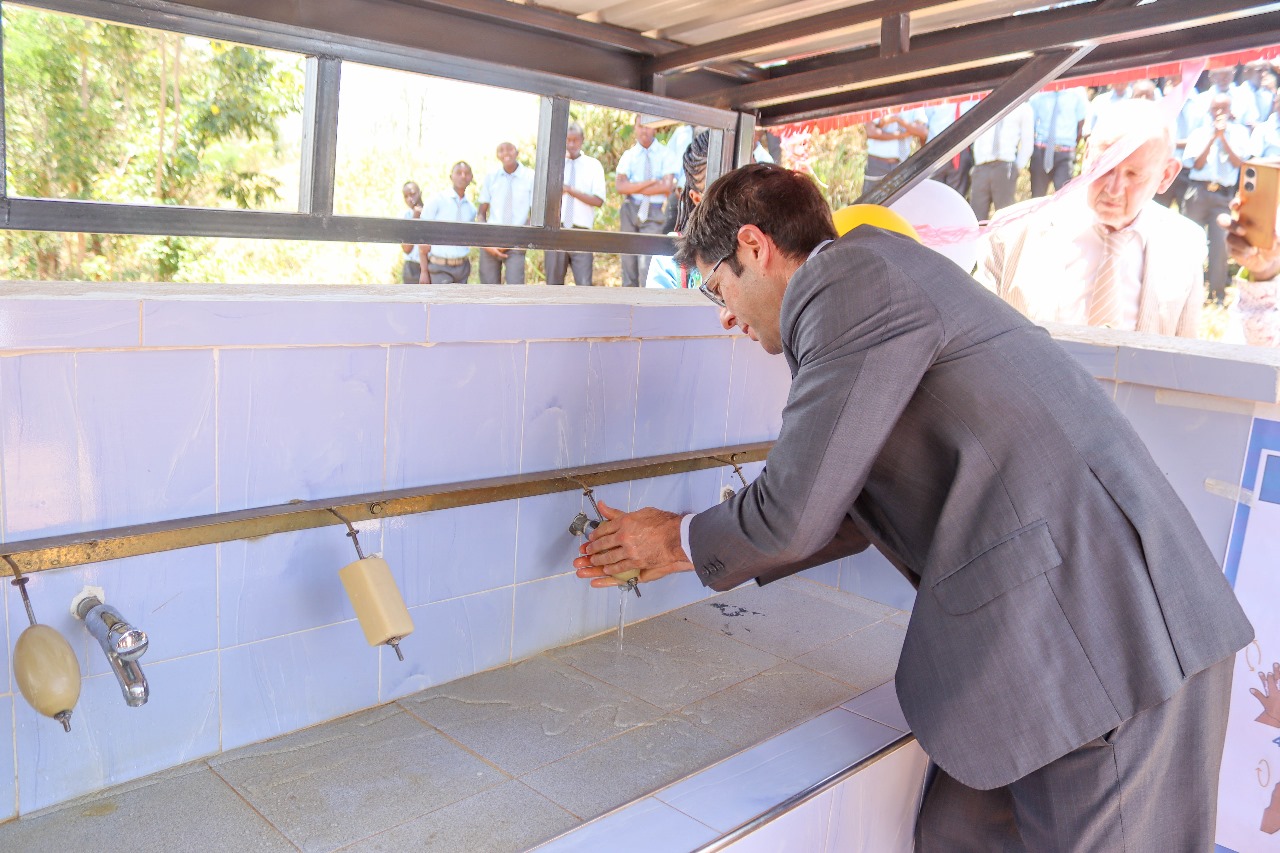 Kirimiri secondary school students washing their hands in a newly fitted hygiene facility donated by a Spanish donor
Kirimiri secondary school students washing their hands in a newly fitted hygiene facility donated by a Spanish donorTwo learning institutions in Maragua constituency, Murang’a county are setting the pace in sanitation and hygiene with the aim of cutting diseases and creating a more conducive learning environment.
Kirimiri primary and secondary schools established comprehensive ablution blocks fitted with washing sinks with push-up taps that minimise water wastage.
The blocks are also fitted with soap dispensers that allow learners to effectively clean their hands after using the toilets, shielding them from diseases caused by poor hygiene.
The blocks were established by Maragua NG-CDF after which a Spanish donor visited the schools and improved on them, erecting a water tank that collects rainwater and establishing sinks.
Peter Mwaura, the primary school’s head teacher, said pupils are most vulnerable to hygiene related illnesses as they play with dirt, shake hands and continuously expose themselves to germs.
“Once the Spanish team visited and saw our toilet block, they expressed their desire to connect it to water to enable children to wash hands immediately after using the facility,” he said.
The school had an old, won out tank that had been donated by the World Vision NGO decades ago and was unusable.
The special needs department of the school, he explained, was worst hit by lack of water, and the donor erected a water tower that channels the commodity to the toilets and the departments through gravity.
“We have now been able to establish a kitchen because we have water. We should all have learnt from the Covid-19 pandemic when queues in hospitals reduced due to washing hands and returned when people stopped observing the hygiene protocols”.
The Spanish Ambassador to Kenya Jaime Moreno visited the school, applauding the partnership between his government and the Kenyan government in implementation of local projects.
“We have a team of Spanish doctors that have been operating here for about 24 years, helping to improve the health conditions of many people,” he said.
The team of doctors has been conducting free surgical
clinics at Maragua Level 4 Hospital annually, providing relief to thousands
of patients.
 Spanish Ambassador to Kenya Jaime Moreno washing his hands at Kirimiri Primary School in Maragua, Murang'a county.
Spanish Ambassador to Kenya Jaime Moreno washing his hands at Kirimiri Primary School in Maragua, Murang'a county.Moreno praised the sanitation project as a trailblazer that has drastically raised hygiene levels for the learners and encouraged similar projects to be undertaken in other primary schools.
“Spain wants to be part of such projects’ support with the partnership of the Kenyan government so we can be on the same page,” he said.
Dr Victorio Torres, the Spanish donor who improved on the project, said handwashing is a vital practice that drastically reduces one’s vulnerability to some diseases.
Some of the diseases prevented by handwashing include respiratory conditions such as common cold, pneumonia, Covid-19 and influenza and diarrhoeal conditions such as cholera, typhoid and rotavirus, salmonella infections.
It may also prevent eye infections such as conjunctivitis, intestinal worms and some skin infections.
According to World Health Organizations (WHO), proper handwashing can reduce diarrhoeal infections by up to 40 per cent, respiratory infections by up to 20 per cent and significantly lower the risk of Covid-19 and flu transmissions.
“Today, we are learning the need to integrate hygiene with sanitation. This project is a collaboration between NG-CDF that constructed the toilets and our contribution to ensure there’s water and soap in compliance with WHO,” Torres said.
WHO recommends washing hands for over 20 seconds with water and soap to remove disease causing germs.
“What we see here is a comprehensive toilet block that provides both hygiene and sanitation. The challenge is to ensure all the over 600 primary schools in the county are also compliant,” he added.
Torres challenged the county government to use the digitisation programme that has been integrated in most local sectors to monitor the schools that are implementing similar projects and the impact on the local health burden.
He said once children learn to always keep their hands clean, the knowledge will be passed on to their parents and siblings at home, creating a significant ripple effect in the community.
MP Mary Waithera said improved hygiene will ensure children focus on their studies without unnecessary disruptions, improving their performance.
She said parents were invited to the launch of the project so that they can also learn the importance of good handwashing and find ways of implementing it at home.
“The NG-CDF has plans to ensure similar projects are replicated in other primary schools because we have seen its impact,” Waithera said.
She said, however, the constituency that is largely semi-arid grapples with water shortages which she said calls for investment in water harvesting facilities to provide the schools with sufficient water to maintain proper hygiene standards.
















